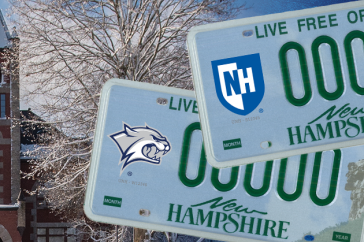The University of New Hampshire is a flagship research university that inspires innovation and transforms lives in our state, nation and world. More than 16,000 students from all 50 states and 71 countries engage with an award-winning faculty in top ranked programs in business, engineering, law, health and human services, liberal arts and the sciences across more than 200 programs of study. UNH’s research portfolio includes partnerships with NASA, NOAA, NSF and NIH, receiving more than $100 million in competitive external funding every year to further explore and define the frontiers of land, sea and space.
Show Your Pride and Support Students with a UNH License Plate

DURHAM, N.H. – New decal license plates now give New Hampshire drivers the chance to show their University of New Hampshire pride and support scholarships for Granite State students.
Last year, UNH became one of the first nonprofits authorized to participate in the state’s new decal license plate program, following the lead of dozens of other states that have specialty plates to support public higher education. Nearly 100 residents already have vehicles sporting the new plates.
“It’s great that these plates give people the opportunity to celebrate their commitment to UNH,” said Patrick Closson '95, president of the UNH Alumni Association board of directors. “UNH plays such a big role in the state, so it’s wonderful that we can give people the chance to show their support for our students and the university.”
Acquiring the decal is an easy, two-part process. First, visit unh.edu/licenseplate to make a tax-deductible gift of $55 or more to The Fund for New Hampshire Students and choose either the Wildcat mascot or UNH logo design. Then, visit any New Hampshire Division of Motor Vehicles (DMV) office location to obtain the plate to which you'll affix your decal. For more information, see the DMV’s decal plate page. For a new plate visit your local town/city clerk office.
All gifts made as part of the license plate decal program are tax deductible, with 100 percent of the proceeds dedicated to supporting students.
Latest News
-
June 18, 2024
-
June 18, 2024
-
May 17, 2024
-
May 14, 2024
-
May 7, 2024

















































